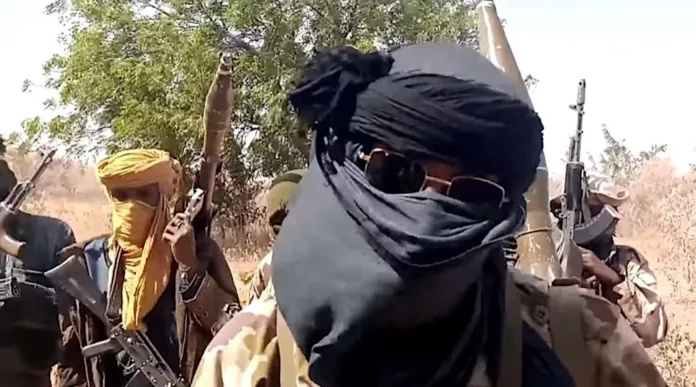A new video has appeared online showing armed bandits claiming that the Nigerian government negotiated with them before the release of students kidnapped from Government Girls Secondary School, Maga, in Kebbi State. The development has raised fresh questions about the government’s handling of school abductions, especially after officials publicly insisted that no ransom was paid.
The footage, shared on X (formerly Twitter) by user @AM_Saleeem, has been spreading quickly across social media. In the two-minute clip, several armed men are seen standing with the schoolgirls, who were abducted last week when gunmen stormed their school. The attack, which led to the death of the school’s vice-principal, was one of the latest in a long line of kidnappings targeting schools in northern Nigeria over the past decade.
In the video, one of the kidnappers is heard questioning the girls about the number of military aircraft that flew over the forest while they were being held. The girls responded that the jets were “uncountable.” The bandit then boasted that despite the heavy presence of military aircraft, the government could not rescue the girls by force.
“Your government could not rescue you with might,” he said. “We are letting you go after negotiations. Your government has failed.”
He further claimed that the authorities were forced to negotiate with them to secure the girls’ release, though he did not state the terms of the alleged deal.
Another armed man asked the students whether they were starved or assaulted during captivity. The girls answered “no” to both questions, though it remains unclear whether they spoke freely or under pressure.
“We will take you back home safe to your parents,” one bandit said. “We are doing this based on peace deals.”
The video surfaced only hours after the Kebbi State governor, Nasir Idris, and the Minister of State for Defence, Bello Matawalle, announced publicly that all the abducted students had been freed. During a press briefing on Tuesday, the officials praised the security agencies involved in the operation and maintained that no ransom was paid.
“We followed due process and ensured that the children were released safely,” Governor Idris said. “There was no ransom. We do not support paying criminals.”
The video, however, has stirred debate and cast doubt on the government’s claims. While governments at both federal and state levels often deny paying ransom, several past incidents have shown that negotiations with armed groups sometimes take place behind closed doors. Security analysts say the new video may complicate the government’s narrative and could encourage more kidnappings if criminals believe negotiation is guaranteed.
Nigeria has been battling mass kidnappings for years, particularly in the North-West and North-East. The most notorious incident remains the 2014 Chibok abduction in Borno State, when Boko Haram kidnapped over 200 schoolgirls. Since then, criminal gangs—often called bandits—have increasingly targeted schools, viewing students as easy targets to pressure government officials for ransom.
Between 2020 and 2022, hundreds of schoolchildren were abducted in Zamfara, Kaduna, Niger, and Katsina states. Many were released only after alleged negotiations and payment of ransom, though authorities rarely confirm such details. These repeated attacks have forced many schools to shut down, especially in rural areas, leaving thousands of children out of school at a time when Nigeria already has one of the world’s largest populations of out-of-school children.
The Kebbi abduction adds to this troubling pattern, raising concerns about the safety of schools in border communities where security presence is weak.
According to security sources and local community members, the attackers stormed the Government Girls Secondary School, Maga, early last week. Eyewitnesses reported that the gunmen arrived on motorcycles and opened fire, causing panic among students and staff. During the attack, the vice-principal of the school was shot dead as he reportedly attempted to protect the students.
The gunmen then rounded up dozens of girls and took them into the surrounding forest. Families waited anxiously for days, with many pleading for government help as they feared the girls could be taken deeper into the forest, making rescue even more difficult.
Hours after the video emerged online, images and short clips released by officials showed the freed students being transported in a bus to Birnin Kebbi, the state capital. The girls appeared relieved, with some smiling and waving to the camera. Government officials said medical checks would be conducted before the girls are reunited with their families.
The state government has announced that the students will be handed over to their parents today. Emotional scenes are expected as many families have spent days unsure of their daughters’ fate.
The new video has triggered mixed reactions across the country. Some Nigerians expressed relief that the girls were released unharmed. However, many others are demanding transparency from both the federal and state governments. Critics argue that government denial of ransom payments only encourages secrecy while leaving the root causes of insecurity unaddressed.
Human rights groups have also raised concerns about the wellbeing of the released girls, urging authorities to offer psychological support, as victims of abduction often suffer long-term trauma.
The latest development highlights the complex security challenges Nigeria faces. Despite ongoing military operations in the North-West, armed groups continue to operate freely in large forested areas. Many rural communities remain vulnerable due to poor road access, limited policing, and the vast size of the territories where bandits hide.
As the nation awaits official confirmation of what truly transpired between the government and the kidnappers, one thing remains clear: the recent abduction is yet another reminder that schools in many parts of Nigeria remain unsafe, and stronger measures are urgently needed to protect students.

